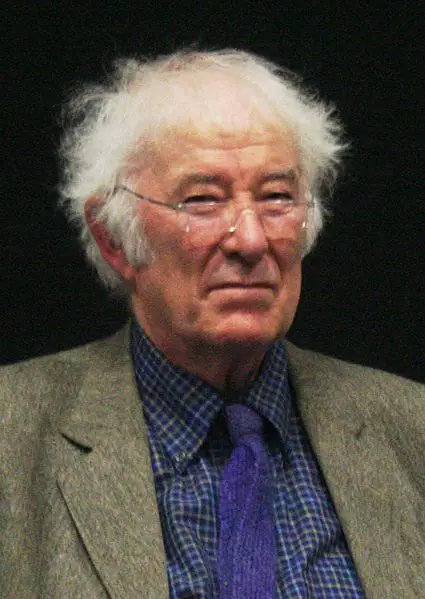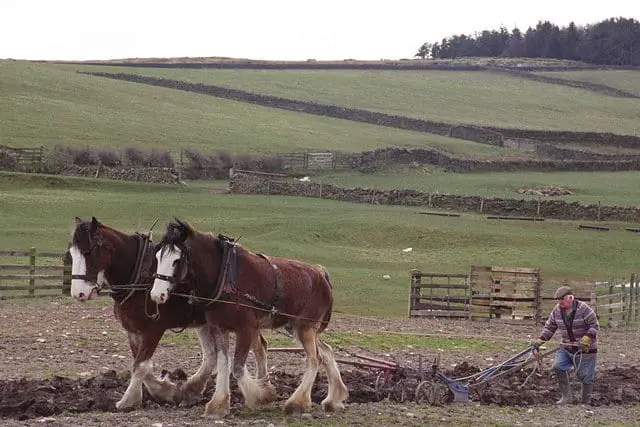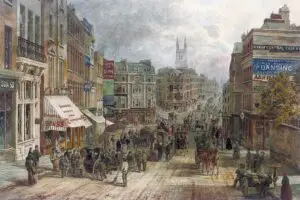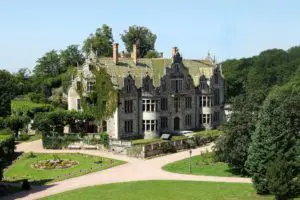
FULL POEM - SCROLL DOWN FOR LINE-BY-LINE ANALYSIS

LINE-BY-LINE ANALYSIS
STANZA 1
My father worked with a horse-plough,
His shoulders globed like a full sail strung
Between the shafts and the furrow.
The horses strained at his clicking tongue.
The poem is a dramatic monologue, which sees the speaker, voiced by the poet, reflecting on his Irish rural upbringing, his father in particular. This opening stanza describes his father and his work on the farm, matter-of-factly introducing the reader to the lifestyle and agricultural labour at the time, with the referencing of equipment such as the ‘horse-plough’ and ‘the shafts and the furrow’ alluding to its gruelling nature. The simile, ‘his shoulders globed like a full sail strung’ emphasises his father’s physical strength and masculinity as well as the speed and purpose with which he ploughs, harnessing the power of his horses just like the sails of a boat harness the power of the wind.
STANZA 2
An expert. He would set the wing
The speaker boldly declares his father ‘an expert’ and this short, blunt sentence and following caesura are designed to illustrate that he is unarguably so.
And fit the bright steel-pointed sock.
These references to his ploughing equipment, once again, highlight the strength and expertise necessary to carry out the work that he is. Additionally, the plosive alliteration in this line reflects how meticulously the man works, with the repeated sharp sounds mirroring the sharp, precise nature of his actions.
The sod rolled over without breaking.
The ‘sod’ is the earth that the man is ploughing. This line is a metaphor which compares the rotation of the earth during the ploughing process to rolling waves approaching the shore. However, unlike waves approaching the shore, the earth remains, thanks to the man’s care and expertise, unbroken.
At the headrig, with a single pluck
‘The headrig’ is a strip of land at the end of a ploughed field which is left unploughed until after the main ploughing is complete, for convenience in turning the plough.
STANZA 3
Of reins, the sweating team turned round
And back into the land. His eye
The continuation of the narrative and the enjambement between the second and third stanzas reflect the man turning his horses around with no pause for rest, another demonstration of his strength. The referral to the man and his horses as ‘the sweating team’ reiterates the gruelling nature of his work as well as the coordination between him and his horses.
Narrowed and angled at the ground,
Mapping the furrow exactly.
‘The furrow’ is a long, narrow trench made in the ground by a plough, used for planting and irrigation. The man’s level of focus when examining it is further evidence of his skill and expertise as well as his precise and diligent work ethic.
STANZA 4
I stumbled in his hobnailed wake,
Fell sometimes on the polished sod;
In the fourth stanza, the narrative shifts from the speaker passively observing his father’s work to becoming an active character. This shift demonstrates the contrast in competency between them and the speaker feels inadequate as he stumbles behind his father, struggling to follow ‘in his hobnailed wake’ (referring to the large-headed nail worn on the sole of his father’s boots for protection that creates distinctive footprints). This contrast is further emphasised by the image of the speaker falling in ‘the polished sod’ (the earth that his father has perfectly ploughed), with the ‘polished sod’ simultaneously acting as a symbol for his father’s skill and his own inadequacy.
Sometimes he rode me on his back
Dipping and rising to his plod.
The speaker’s father carrying his son on his back and ‘dipping and rising to his plod’ is another nautical image – a motif of the poem. This one describes the movement of his father like a ship, but instead of riding the waves of the ocean he rides the furrows of his ploughed land. It signifies his father’s caring, patient nature as well as the speaker’s sense of security when on his father’s back, likened to the security offered by a boat from the intimidating ocean.
STANZA 5
I wanted to grow up and plough,
To close one eye, stiffen my arm.
Having admired his father throughout his childhood, the speaker wanted to follow in his father’s footsteps and learn to plough, hoping to one day emulate his father’s skill.
All I ever did was follow
In his broad shadow round the farm.
However, quite tragically the speaker feels that he is a let-down and a failure by not learning and instead just following his father around the farm. This line links to the title of the poem, ‘follower’, revealing Heaney’s thoughts behind it. The image of the speaker as he follows ‘in his [father’s] broad shadow round the farm’ is an adaptation of the phrase ‘to be in one’s shadow’, describing his feeling of inadequacy when comparing himself to his strong, successful father.
STANZA 6
I was a nuisance, tripping, falling,
Yapping always. But today
Heaney’s use of the triplet, ‘tripping, falling, yapping’ emphasises how annoying his presence must have been to his father as well as how hopeless he felt trying to emulate him during his childhood.
It is my father who keeps stumbling
Behind me, and will not go away
The temporal marker, ‘but today’, acts to suddenly switch the narrative from the speaker’s recollection of his childhood to the reality that is the present. The roles of the speaker and his father are now reversed in the present, as it is the speaker’s father, now old and frail, stumbling behind the speaker (now the stronger farmer). It is a thought-provoking conclusion to the poem as it leaves the reader contemplating the effects of ageing and its impact on the father-son dynamic.


